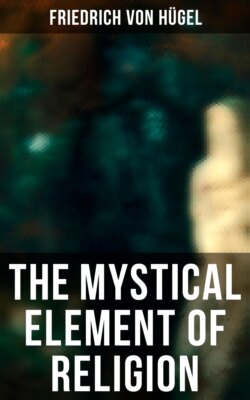Читать книгу The Mystical Element of Religion - Friedrich von Hügel - Страница 144
На сайте Литреса книга снята с продажи.
XII. Her Conversations with her Disciples; “Caterina Serafina.” Don Marabotto and the Possessed Maid. 1. Pure Love and Heaven.
ОглавлениеIt is probably during the next two years of her life, that occurred the beautiful scene and conversation,—so typical of her relations with her disciples during this first part of her last period (1499 to 1501), which we can think of as her spiritual Indian summer, her Aftermath. The scene has been recorded for us by her chief interlocutor, Vernazza. Probably Bartolommea, Ettore’s wife, was present, and possibly also Don Marabotto. “This blessed soul,” he writes, “all surrounded though she was by the deep and peaceful ocean of her Love, God, desired nevertheless to express in words, to her spiritual children, the sentiments that were within her. And many a time she would say to them: ‘O would that I could tell what my heart feels!’ And her children would say: ‘O Mother, tell us something of it.’ And she would answer: ‘I cannot find words appropriate to so great a love. But this I can say with truth, that if of what my heart feels but one drop were to fall into Hell, Hell itself would altogether turn into Eternal Life.’”[136] “And one of these her spiritual children, an interior soul (un Religioso),”—Vernazza, present on this occasion,—“dismayed at what she was saying, replied: ‘Mother, I do not understand this; if it were possible, I would gladly understand it better.’ But Catherine answered: ‘My son, I find it impossible to put it otherwise.’ Then he, eager to understand further, said: ‘Mother, supposing we gave your word some interpretation, and that this corresponded to what is in your mind, would you tell us if it was so?’ ‘Willingly, dear son,’ rejoined Catherine, with evident pleasure.”
“And the disciple continued: ‘The matter might perhaps stand in this wise.’ And he then explained how that the love which she was feeling united her, by participation, with the goodness of God, so that she no more distinguished herself from God. Now Hell stands for the very opposite, since all the spirits therein are in rebellion against God. If then it were possible for them to receive even a little drop of such union, it would deprive them of all rebellion against God, and would so unite them with Love, with God Himself, as to make them be in Life Eternal. For Hell is everywhere where there is such rebellion; and Life Eternal, wheresoever there is such union. And the Mother, hearing this, appeared to be in a state of interior jubilation; whence with beaming face she answered: ‘O dear son, truly the matter stands as you have said; and hearing you speak, I feel it really is so. But my mind and tongue are so immersed in this Love, that I cannot myself either say or think these or other reasons.’ And the Disciple then said: ‘O Mother, could you not ask your Love, God, for some of these little drops of union for your sons?’ She answered, and with increased joyousness: ‘I see this tender Love to be so full of condescension to these my sons, that for them I can ask nothing of It, and can only present them before His sight.’”[137]
I sincerely know not where to look for a doctrine of grander depth and breadth, of more vibrating aliveness; for one more directly the result of life, or leading more directly to it, than are those few half-utterances and delicately strong indications of an overflowing interior plenitude and radiant, all-conquering peace.
And even one such scene is sufficient to make us feel that the following passage of the Dialogo is, in its substance and tone, profoundly true to facts: “This soul remained henceforth” (in this third period) “many a time in company with its many spiritual friends, discoursing of the Divine Love, in such wise that they felt as though in Paradise, both collectively, and each one in his own particular way. How delightful were these colloquies! He who spoke and he who listened, each one fed on spiritual food of a delicious kind; and because the time flew so swiftly, they never could attain satiety, but, all on fire within them, they would remain there, unable at last to speak, unable to depart, as though in ecstasy.”[138]
